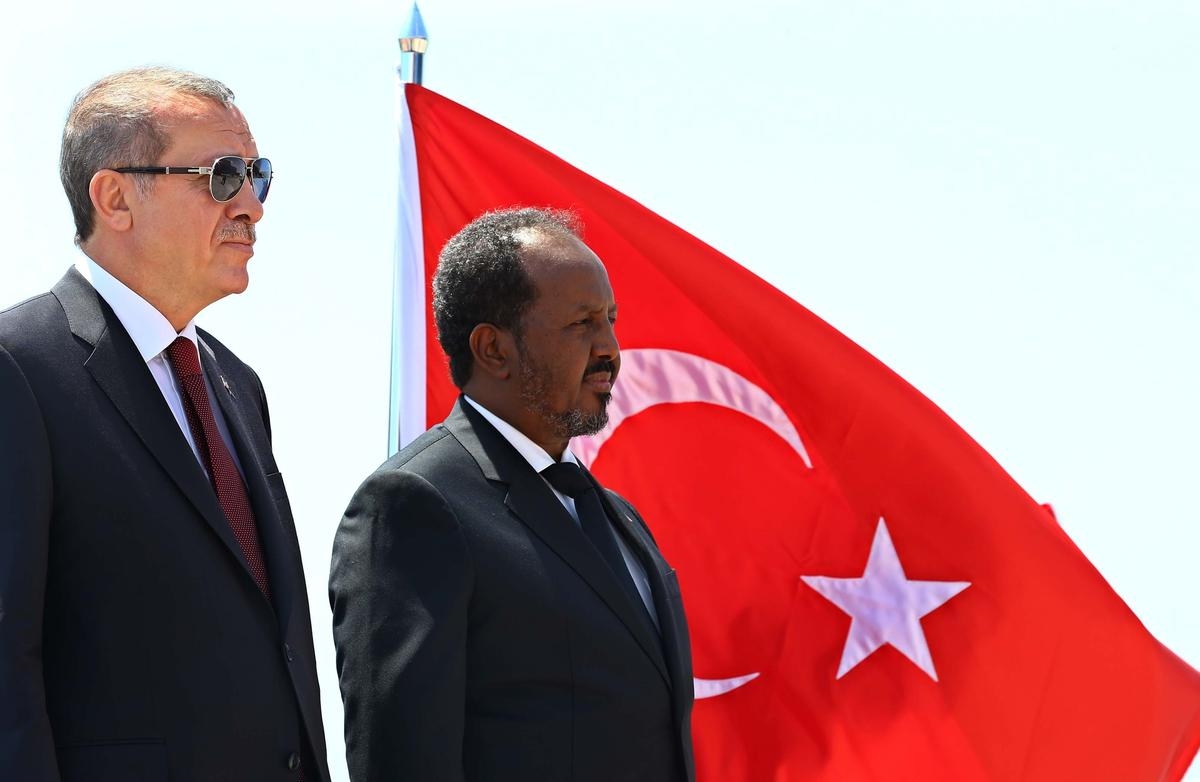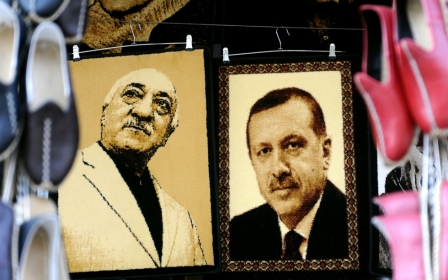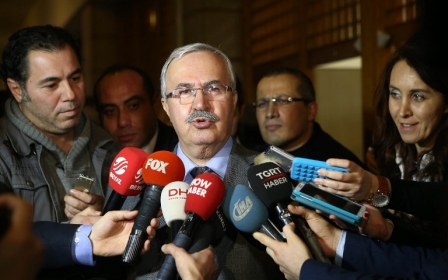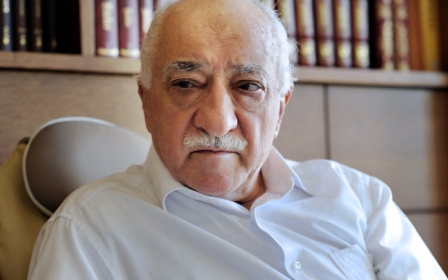ANALYSIS: Turkey strengthens ties in Africa

ISTANBUL, Turkey - Turkish Pesident Recep Tayyip Erdogan paid official visits to Ethiopia, Djibouti and Somalia last week, as the three Horn of Africa countries have been increasingly on the scope of Ankara's investment and aid initiatives over the past few years.
While in Ethiopia alongside a large number of delegates, Erdogan met with Ethiopian Prime Minister Hailemariam Desalegn, attended several meetings, and delivered the closing remarks of the Djibouti-Turkey business forum in the capital city. Deputy Prime Minister Numan Kurtulmus, meanwhile, promised to renovate three Ottoman-era mosques in Djibouti.
The president's visit to Somalia was of great importance, considering the current security situation in the war-stricken nation. Just three days before Erdogan arrived in Mogadishu, a bomb was detonated near the hotel where the Turkish delegation was staying, killing three Somalis. After armed group al-Shabaab claimed responsibility, Erdogan announced that he would proceed with his visit.
In 2011, Erdogan, then acting as prime minister, visited Somalia, along with his cabinet members and NGO representatives, in what was the first visit from a non-African leader in the last two decades. Al-Shabaab launched several attacks against Turkish personnel and property in Somalia after that trip.
"For more than three years, Turkey has been cooperating with the Somali government and helping the country with reconstruction efforts with its official channels and non-governmental organisations," Erdogan said at a press conference in Mogadishu on Sunday.
Somalia's President Hassan Sheikh Mohamud recalled the history of Somalia-Turkey relations, emphasising links during the Ottoman era. "There is a tremendous difference between the Somalia of three years ago and the Somalia of today," Mohamud said. "Turkey's contribution is indispensable for Somalia's reconstruction."
Turkey's presence in Africa
According to the Turkish Foreign Ministry, current relationships between Ankara and African nations is the continuation of efforts that were first undertaken in 1998, when Turkey decided to increase its trade volume with African countries in the aftermath of the Cold War.
The Undersecretariat for Foreign Trade launched its strategy on the development of the economic relations with Africa at large in 2003, and since then, Turkey has gradually increased its presence on the continent.
In 2005, Turkey was accorded observer status by the African Union and became one of the AU's strategic partners in 2008. Various high-level summits established the follow-up mechanisms to sustain cooperation.
While as of 2009 Turkey had only 12 embassies on the African continent, today there are 35 high-level diplomatic representations, and four forthcoming. In return, African embassies in Ankara increased from 10 to 28 over the last five years.
Bilateral trade volume has nearly tripled, from $9bn in 2005 to $23bn in 2013, of which $7.5bn is with Sub-Saharan countries. Turkey's state-subsidised Turkish Airlines has regular flights to 42 destinations in 28 African countries - the largest number in the world.
In Somalia alone, Turkey has taken part in essential infrastructure projects. It has built field hospitals and has provided medical equipment and infrastructure. The Turkish Cooperation and Coordination Agency (TIKA) initiated the drilling of wells in the drought-hit country in cooperation with the State Hydraulic Works (DSI).
According to Mehmet Ozkan, director of the International Centre for Terrorism and Transnational Crime in Turkey (UTSAM), Turkish-Somali relations reflect an important turning point in Turkey's Africa expansion strategy.
"Turkey's involvement in Somalia has changed Turkey's overall African policy from a trade and aid-centred one to one that is geared to becoming a problem-solver for the continent," Ozkan wrote.
The biggest difference in Turkey's effort perhaps, is the difference in the attitude and intention of non-African countries. For Abdi Aynte, a long-time Somalia observer and executive director of Mogadishu-based think-tank Heritage Institute, Turkey is being perceived as an honest partner in Somalia.
"My understanding is that Turkey is investing in the stability of Somalia, while others are sometimes waiting for Somalia to stabilise before they invest," he told Middle East Eye.
Emphasising how a small contribution could make such a big difference on the country, Aynte added that a US$500m investment has had a very substantial impact on alleviating humanitarian crisis and development.
Why is Turkey in Africa?
According to Ibrahim Kalin, the Turkish Presidency's spokesperson, Turkey's Africa initiative is a reflection of its multidimensional foreign policy vision. "In the era of neo-colonial tendencies in Africa, Turkey wants to deliver the 'African solutions to African problems' perspective to the continent," he recently wrote.
Though this appears to be a noble quest, Turkey's activities in the Sub-Saharan Africa are mainly directed at Muslim-majority countries. Trade figures as well as high-level bilateral visits show Turkey's focus is primarily on former Ottoman territories, like the Horn of Africa, or countries with sizeable Muslim populations like Nigeria, Senegal and Sudan.
For Mehmet Ozkan at UTSAM, the shared religion of Islam plays an important role in legitimising Turkey's presence in Somalia, as opposed to Western and non-Western actors.
"Turkey's Muslim identity could play a role in facilitating the establishment of trust between the countries in respect. However, I do not think that religion plays an essential role in reaching out to the African countries at large," Ozkan told MEE.
Ongoing fight against Gulen movement
Another aspect of Erdogan's visit was the government's battle against the Gulen Movement and its leader, Fetullah Gulen. The movement has a strong presence with high-quality schools in the least developed and developing Muslim-majority countries of Africa and Central Asia.
Spanning more than 160 countries around the world, the self-exiled Muslim cleric's schools had been promoted by the Turkish government's initiative until hostilities between the government and the movement came to the fore.
At a press conference in Ethiopia last Thursday, Erdogan stated that Turkey's national education ministry could deliver the same services that are being provided in Gulen schools.
"We are telling the leaders of the countries that we are visiting that our ministry could take part in education in return for the closure of those schools," Erdogan said in Addis Ababa. "Our ministry has almost completed the preparations for that."
In return, referring to Gulen schools, Ethiopian Prime Minister Desalegn said: "We will be seeking the Turkish government's support and consent when we engage in a relationship with an institution."
On Monday, Deputy Prime Minister Bulent Arinc announced that the government was working on finding ways to take over those schools.
However, UTSAM's Ozkan said he did not see this as a feasible option for two reasons. "On one hand, the education ministry already has schools abroad and they do not perform well due to budget cuts and qualified staff shortages.
"On the other hand, most of the Gulen schools abroad are functioning under a special charter and work as foundations. I do not see the countries in respect would close those schools at the request of Turkey," he continued.
According to Erkam Tufan Aytav at Turkey's Journalists and Writers Foundation, an organisation affiliated to the Gulen Movement that aims to promote intercultural dialogue, this wasn't the first time Erdogan attempted to close down Gulen schools around the world.
"He did so when he was still the prime minister and he delegated the task to Turkey's foreign representations," Aytav told MEE. "When he realised that ambassadors were not able to exert the desired influence, he took the matter into his own hands."
Aytav said the current government is acting similarly to the military in the 1990s.
"During the 28 February process, [the 1997 coup in Turkey where the Islamist Welfare Party coalition government had to resign] the successor government tried to expropriate these schools. Now it [the government] is calling for their closure and in return is offering to open Turkish government-sponsored schools," Aytav said. "I have seen this in Kyrgyzstan and it failed, and I think this is a futile attempt."
Erdogan had limited success with the closure of some Gulen schools in Russia and Azerbaijan. However, as Turkey's success or failure on the continent depends on the sustainability of investments and political changes, Erdogan's success in replacing Gulen schools with government-sponsored ones remains to be seen.
New MEE newsletter: Jerusalem Dispatch
Sign up to get the latest insights and analysis on Israel-Palestine, alongside Turkey Unpacked and other MEE newsletters
Middle East Eye delivers independent and unrivalled coverage and analysis of the Middle East, North Africa and beyond. To learn more about republishing this content and the associated fees, please fill out this form. More about MEE can be found here.




